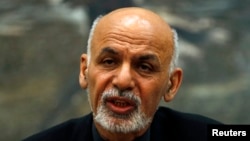Afghan President Ashraf Ghani has nominated the 25-member Cabinet of his so-called "National Unity Government." Monday’s announcement came after months of delays and missed deadlines, raising questions about future political stability in strife-torn Afghanistan.
Ghani and his election-rival-turned coalition partner, Abdullah Abdullah, have spent more than three months wrangling over the make of the Cabinet. Both have been under severe criticism for the delay at a time of mounting security and economic challenges facing their country.
Afghan presidential chief of staff, Abdul Salaam Rahimi, unveiled the list of 25 cabinet ministers at a ceremony in Kabul attended by Ghani. He said three women are in the list to head ministries of Information, Women's Affairs and Higher Education.
Rahimi explained the Afghan constitution binds the president to introduce the Cabinet nominees to the lower house of parliament for a vote of confidence.
The house speaker later said the vote of confidence will likely occur Saturday.
Afghan observers do not see a major break from the country’s patronage system and admit nominations to key posts reflected political networks over professional qualification.
Experts 'carefully optimistic'
Regional Studies Center of Afghanistan head Abdul Ghafoor Liwal says it appears an effort has been made to give representation to all Afghan ethnic groups and provinces in the new Cabinet. He says an effective government will require internal cooperation and support from Afghanistan’s international partners.
“I am carefully optimistic," he said. "It depends as to how much [the new government] will bring good governance to Afghanistan and how much they will focus on economic stability in Afghanistan, and how much neighboring countries will help Afghanistan to work together and jointly for regional peace.”
Nominees for the Afghan intelligence service and the central bank were also announced.
The Cabinet ministers were reportedly chosen from two lists of names forwarded by Ghani and Abdullah to their negotiating teams.
The four most powerful ministries were evenly shared between the two camps. Defense minister nominee Afghan army chief Sher Mohammad Karimi and would-be finance minister Ghulam Jilani Popal are seen as close to President Ghani. While nominees for the foreign and interior ministries, Salahuddin Rabbani and Nur ul-Haq Ulumi, respectively, are known for their loyalties to Abdullah.
Political uncertainty has been prevailing in Afghanistan because of a months-long election crisis, and many blame the escalation in Taliban attacks across the country for the new leadership’s inability to form a Cabinet, despite repeated pledges.
Critics are concerned about a Ghani-led unity government being able to work effectively with Abdullah serving as the chief executive officer with equal powers. The two leaders agreed to form the national unity government under a U.S. mediated deal, after allegations of vote rigging threatened to push Afghanistan back to armed ethnic confrontations.




